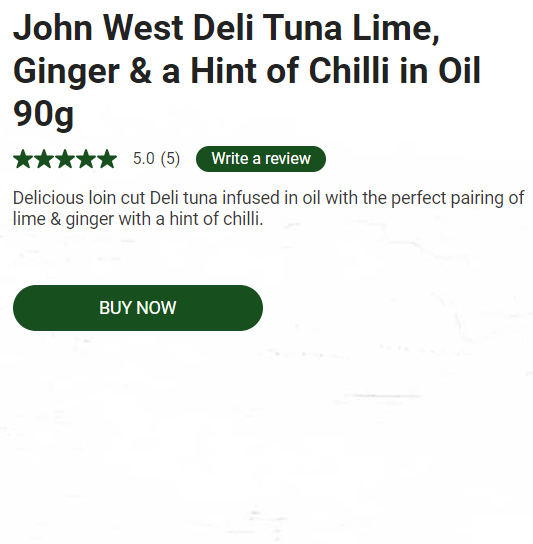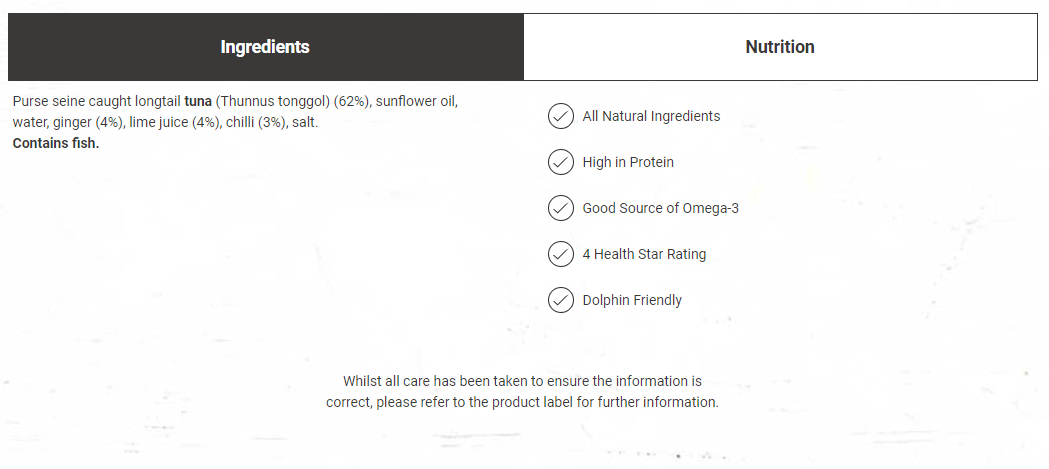Sustainable Seafood
At John West, we’re passionate about seafood and we’re passionate about our oceans which is why we’re committed to safeguarding their future. Our Oceans Forever is about working closely with our partners and suppliers to continually improve fishing practices, now and for generations to come.
Join us on our journey towards a more sustainable seafood future.
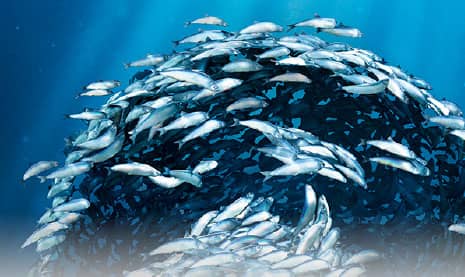
RESPONSIBLE SOURCING
At John West, we are taking an active role in safeguarding our ocean's resources and the wellbeing of coastal communities who depend on them for their livelihood.
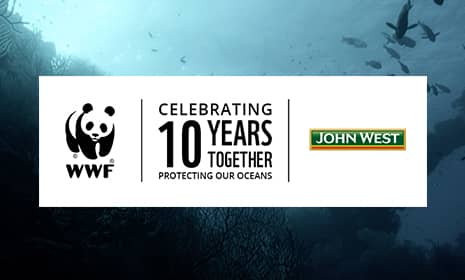
WWF PARTNERSHIP
In 2021, John West celebrates 10 years of working together with the World Wide Fund for Nature, Australia, to reject irresponsible fishing practices and help safeguard the future of our oceans.
Please see our video at the top of this page.
We have in place a Responsible Seafood Sourcing Program supported by an advanced Policy and framework, that reinforces our commitment to building a better future for our oceans. As a leading seafood brand, we believe we have an important role to play in actively contributing to ensuring resources are respected and used wisely so that fish stocks continue to be healthy, productive, and resilient. The Policy and Program has been developed in collaboration with leaders in sustainable fishing, including MRAG Asia Pacific, the Marine Stewardship Council (MSC) and WWF Australia. It includes a focus on:
- Continuous improvement,
- Preferentially sourcing seafood from credible, independently certified programs,
- Removing products from our supply chains that do not align with our responsible sourcing values, and
- Actively encouraging change in supply chains where there is currently limited demand for and thus supply of responsibly sourced seafood.
We will regularly review the Policy and Program to ensure we are adhering to our values and giving our customers and consumers the confidence that we offer responsible seafood solutions. We are committed to keeping our oceans and fish stocks healthy so we can contribute to feeding the world for generations to come.
Please see our video at the top of this page.
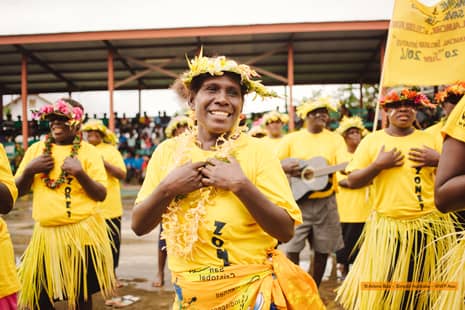
JOHN WEST CONSERVATION PROJECT
John West has invested in a number of WWF marine conservation projects aimed at creating more responsible sourced seafood, sustainable fisheries and improve the social and economic well-being of fishing communities.
John West Conservation Projects
In 2012 we established The John West Conservation Program – a series of WWF marine conservation projects aimed at creating more responsibly sourced seafood, sustainable fisheries and improve the social and economic well-being of fishing communities.
This program is part of Our Oceans Forever and our partnership with WWF, seeking to improve the sustainability our seafood supply chain.
By choosing John West you’re helping to support Pacific Island conservation projects, working to provide coastal communities access to a secure source of food and income, while protecting reefs and local resources for the future, helping to ensure we have healthy oceans forever.
We are currently supporting several projects, in partnership with WWF. These include:
Pacific Island Conservation Project
In partnership with WWF, the John West Pacific Islands Conservation Project supports community-based fishing and micro-financing projects in Ghizo in the Solomon Islands and Madang in Papua New Guinea. The goal is to protect over-exploited reef ecosystems, create food security, boost local economies, and to diversity income streams for the community so they are not soley reliant on fishing. This will also provide greater business opportunities for local women.
These Pacific Island communities rely heavily on the ocean as their primary source of both protein and income. With overfishing occurring, the reefs and reef fish are under enormous pressure and fast growing populations are also putting increasing demands on overfished reefs.
WWF, together with the Australian Government Department of Foreign Affairs and Trade through the Australian NGO Cooperation Program (ANCP), is working with these communities to deploy small floating rafts anchored to the seafloor and close to shore, to attract different types of fish and move fishing away from the reef. Fishers can then quickly and easily catch enough fish to feed their families, with extra to sell at the markets and at the same time, reduce environmental damage to fragile reef areas.
The John West Pacific Islands Conservation Project also co-funds a scheme to help local people (especially women) develop the skills and capacity to establish small businesses that can take advantage of catching more fish and trading the surplus. To date, the progress of this scheme has been a great success with over 300 women, from seven community zones, participating in financial literacy training.
John West is continuing its support of this project in partnership with WWF and the Australian Government to:
- support and build the capacity, expansion and sustainability of the micro-financing schemes in both Ghizo and Madang;
- support target communities in exploring commercial opportunities from the increased volumes of higher value fish;
- explore business opportunities, especially for women, from the micro-savings and revolving loan funds;
- maintain the ongoing fisheries and socio-economic monitoring programs; and
- continuing to develop, build capacity and apply rafter-related community-based fisheries co-management strategies.
- Together, John West Australia, WWF and the Australian Government are working to protect reefs and local resources for the future, while ensuring the coastal communities of today can access a secure source of food and income.
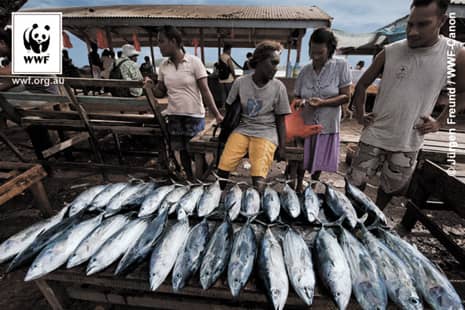
PARTNERS
John West has partnered with a number of industry bodies, government and non-government organisations and experts to achieve our sustainability goals.
Sustainability is a journey we embarked on many years ago but it’s an aspiration that we share with many other like-minded organisations. We can’t do it alone. We've partnered with a number of industry bodies, government and non-government organisations and experts to achieve our sustainability goals.
John West Australia is an active participant or member of the below organisations:
Sedex
Sedex, the Supplier Ethical Data Exchange, is a not for profit membership organisation dedicated to driving improvements in responsible and ethical business practices in global supply chains.
The Australian Retail and Supplier Roundtable
The Australian Retail and Supplier Roundtable has been established by the Australia Food and Grocery Council, Woolworths and Coles as the first national forum for the Australian consumer goods industry. It is a CEO lead cross-industry forum to facilitate greater private and public sector collaboration across the food & grocery value chain. This is the first multi-sector collaborative forum of its kind within Australia, and is modelled on the highly successful international Consumer Goods Forum. The R&SR is an Australian not-for-profit incorporated organisation that is designed and driven by its members to act upon, inform and influence significant matters that impact upon food & grocery products to Australian consumers.
MRAG Australia Pacific
John West Australia actively encourages independent monitoring. MRAG Asia Pacific is a consulting firm dedicated to promoting sustainable utilisation of natural resources through sound integrated management policies and practices. MRAG Asia Pacific regularly audit our business to help us deliver continuous improvement to our supply chain.
Regional Fisheries Management Organisation
We fully support the Regional Fisheries Management Organisation (RFMOs) which exist to responsibly manage fish populations. We collaborate with RFMOs on tagging programs and information sharing to help better manage fisheries.
The International Seafood Sustainability Foundation
John West Australia is an active supporter of the International Seafood Sustainability Foundation (ISSF) which brings together scientists, industry and the environmental NGO community in order to undertake science-based initiatives to support the long-term conservation and sustainable use of tuna populations.
John West Conservation Projects
In 2012 we established The John West Conservation Program – a series of WWF marine conservation projects aimed at creating more responsibly sourced seafood, sustainable fisheries and improve the social and economic well-being of fishing communities.
This program is part of Our Oceans Forever and our partnership with WWF, seeking to improve the sustainability our seafood supply chain.
By choosing John West you’re helping to support Pacific Island conservation projects, working to provide coastal communities access to a secure source of food and income, while protecting reefs and local resources for the future, helping to ensure we have healthy oceans forever.
We are currently supporting several projects, in partnership with WWF. These include:
Pacific Island Conservation Project
In partnership with WWF, the John West Pacific Islands Conservation Project supports community-based fishing and micro-financing projects in Ghizo in the Solomon Islands and Madang in Papua New Guinea. The goal is to protect over-exploited reef ecosystems, create food security, boost local economies, and to diversity income streams for the community so they are not soley reliant on fishing. This will also provide greater business opportunities for local women.
These Pacific Island communities rely heavily on the ocean as their primary source of both protein and income. With overfishing occurring, the reefs and reef fish are under enormous pressure and fast growing populations are also putting increasing demands on overfished reefs.
WWF, together with the Australian Government Department of Foreign Affairs and Trade through the Australian NGO Cooperation Program (ANCP), is working with these communities to deploy small floating rafts anchored to the seafloor and close to shore, to attract different types of fish and move fishing away from the reef. Fishers can then quickly and easily catch enough fish to feed their families, with extra to sell at the markets and at the same time, reduce environmental damage to fragile reef areas.
The John West Pacific Islands Conservation Project also co-funds a scheme to help local people (especially women) develop the skills and capacity to establish small businesses that can take advantage of catching more fish and trading the surplus. To date, the progress of this scheme has been a great success with over 300 women, from seven community zones, participating in financial literacy training.
John West is continuing its support of this project in partnership with WWF and the Australian Government to:
- support and build the capacity, expansion and sustainability of the micro-financing schemes in both Ghizo and Madang;
- support target communities in exploring commercial opportunities from the increased volumes of higher value fish;
- explore business opportunities, especially for women, from the micro-savings and revolving loan funds;
- maintain the ongoing fisheries and socio-economic monitoring programs; and
- continuing to develop, build capacity and apply rafter-related community-based fisheries co-management strategies.
- Together, John West Australia, WWF and the Australian Government are working to protect reefs and local resources for the future, while ensuring the coastal communities of today can access a secure source of food and income.
Sustainability is a journey we embarked on many years ago but it’s an aspiration that we share with many other like-minded organisations. We can’t do it alone. We've partnered with a number of industry bodies, government and non-government organisations and experts to achieve our sustainability goals.
John West Australia is an active participant or member of the below organisations:
Sedex
Sedex, the Supplier Ethical Data Exchange, is a not for profit membership organisation dedicated to driving improvements in responsible and ethical business practices in global supply chains.
The Australian Retail and Supplier Roundtable
The Australian Retail and Supplier Roundtable has been established by the Australia Food and Grocery Council, Woolworths and Coles as the first national forum for the Australian consumer goods industry. It is a CEO lead cross-industry forum to facilitate greater private and public sector collaboration across the food & grocery value chain. This is the first multi-sector collaborative forum of its kind within Australia, and is modelled on the highly successful international Consumer Goods Forum. The R&SR is an Australian not-for-profit incorporated organisation that is designed and driven by its members to act upon, inform and influence significant matters that impact upon food & grocery products to Australian consumers.
MRAG Australia Pacific
John West Australia actively encourages independent monitoring. MRAG Asia Pacific is a consulting firm dedicated to promoting sustainable utilisation of natural resources through sound integrated management policies and practices. MRAG Asia Pacific regularly audit our business to help us deliver continuous improvement to our supply chain.
Regional Fisheries Management Organisation
We fully support the Regional Fisheries Management Organisation (RFMOs) which exist to responsibly manage fish populations. We collaborate with RFMOs on tagging programs and information sharing to help better manage fisheries.
The International Seafood Sustainability Foundation
John West Australia is an active supporter of the International Seafood Sustainability Foundation (ISSF) which brings together scientists, industry and the environmental NGO community in order to undertake science-based initiatives to support the long-term conservation and sustainable use of tuna populations.
MARINE STEWARDSHIP COUNCIL
John West is a strong supporter of the Marine Stewardship Council (MSC) the world's leading certification programs for wild-caught, sustainable seafood.
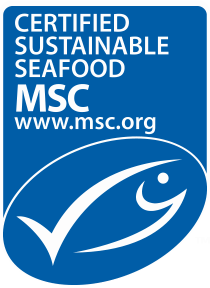
Marine Stewardship Council (MSC)
The Marine Stewardship Council (MSC) is a global, independent, not for profit organisation originally established in 1997 by WWF and Unilever. Becoming independent in 1999, MSC aims to address the issue of seafood sustainability with the fishing industry.
Working to ensure fish populations are responsibly managed for the future, MSC only awards its eco label to fisheries that have achieved certification to its stringent sustainability standards. John West Australia is a strong supporter of the MSC’s mission to encourage and promote the best sustainable and environmental choices in seafood.
Our Oceans Need Help.
Today, 3 billion people depend on seafood as their primary source of protein. 1 in 10 people around the world rely on the seafood industry for their livelihoods. Healthy oceans are essential for thriving marine ecosystems, livelihoods and economies. Today our oceans are under increasing pressure. Unsustainable fishing is harming fish populations, habitats and fishing economies. As the world's population increases, sustainable fishing practices become more important than ever. Unless we make a change, fish stocks may be exhausted in our lifetime.
Fully Certified - the world's best standard in sustainability, every time.
The Marine Stewardship Council is the world's leading certification program for wild-caught, sustainable seafood. Each can of John West skipjack tuna proudly displays its blue certification ecolabel. Your choice of MSC certified sustainable John West tuna helps contribute to a sustainable future for our oceans.
28 Performance Indicators for Assessing Fisheries.
The MSC's third-party certification process for fisheries is rigorous, transparent and based in science. Fisheries are assessed by independent scientific teams against the MSC standard and its three core principles: maintaining a sustainable level of fish stocks, minimising environmental impact and effective fishery management. Once fisheries have been certified to MSC, they are independently audited to ensure ongoing compliance to all MSC standards.
Generating Improvements in Ocean Health
MSC certified fisheries are producing real results - on average they have increased the abundance of fish stocks 46% over ten years, compared with only 9% for uncertified fisheries.
AQUACULTURE STEWARDSHIP COUNCIL
The Aquaculture Stewardship Council (ASC) is a leading global certification and labelling programs for responsibly farmed seafood.
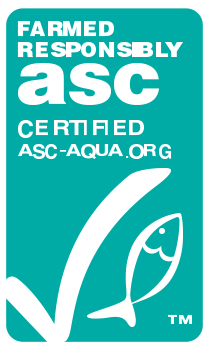
Aquaculture Stewardship Council (ASC)
The Aquaculture Stewardship Council (ASC) is a leading global certification and labelling program for responsibly farmed seafood (aquaculture).
ASC is an independent, non-profit organisation that was established in 2010 by WWF and IDH (Dutch Sustainable Trade Initiative) to manage a global set of standards for aquaculture.
The ASC aims to be the world's leading certification and labelling program for responsibly farmed seafood. The ASC is a global organisation working with aquaculture producers, seafood processors, retail and foodservice companies, scientists, conservation groups and the public to promote the best environmental and social choice in seafood.
The ASC's aquaculture certification program and seafood label recognises and rewards responsible aquaculture.
Marine Stewardship Council (MSC)
The Marine Stewardship Council (MSC) is a global, independent, not for profit organisation originally established in 1997 by WWF and Unilever. Becoming independent in 1999, MSC aims to address the issue of seafood sustainability with the fishing industry.
Working to ensure fish populations are responsibly managed for the future, MSC only awards its eco label to fisheries that have achieved certification to its stringent sustainability standards. John West Australia is a strong supporter of the MSC’s mission to encourage and promote the best sustainable and environmental choices in seafood.
Our Oceans Need Help.
Today, 3 billion people depend on seafood as their primary source of protein. 1 in 10 people around the world rely on the seafood industry for their livelihoods. Healthy oceans are essential for thriving marine ecosystems, livelihoods and economies. Today our oceans are under increasing pressure. Unsustainable fishing is harming fish populations, habitats and fishing economies. As the world's population increases, sustainable fishing practices become more important than ever. Unless we make a change, fish stocks may be exhausted in our lifetime.
Fully Certified - the world's best standard in sustainability, every time.
The Marine Stewardship Council is the world's leading certification program for wild-caught, sustainable seafood. Each can of John West skipjack tuna proudly displays its blue certification ecolabel. Your choice of MSC certified sustainable John West tuna helps contribute to a sustainable future for our oceans.
28 Performance Indicators for Assessing Fisheries.
The MSC's third-party certification process for fisheries is rigorous, transparent and based in science. Fisheries are assessed by independent scientific teams against the MSC standard and its three core principles: maintaining a sustainable level of fish stocks, minimising environmental impact and effective fishery management. Once fisheries have been certified to MSC, they are independently audited to ensure ongoing compliance to all MSC standards.
Generating Improvements in Ocean Health
MSC certified fisheries are producing real results - on average they have increased the abundance of fish stocks 46% over ten years, compared with only 9% for uncertified fisheries.
Aquaculture Stewardship Council (ASC)
The Aquaculture Stewardship Council (ASC) is a leading global certification and labelling program for responsibly farmed seafood (aquaculture).
ASC is an independent, non-profit organisation that was established in 2010 by WWF and IDH (Dutch Sustainable Trade Initiative) to manage a global set of standards for aquaculture.
The ASC aims to be the world's leading certification and labelling program for responsibly farmed seafood. The ASC is a global organisation working with aquaculture producers, seafood processors, retail and foodservice companies, scientists, conservation groups and the public to promote the best environmental and social choice in seafood.
The ASC's aquaculture certification program and seafood label recognises and rewards responsible aquaculture.
WORLD WIDE FUND FOR NATURE PARTNERSHIP
John West supports World Wide Fund for Nature's (WWF) efforts to protect marine life and expand sustainable fishing practices globally
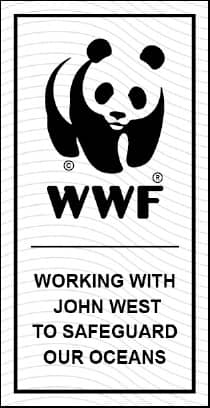
WWF
John West supports World Wildlife Fund's (WWF) efforts to protect marine life and expand sustainable fishing practices globally - a partnership to create lasting change through a collaboration of business, science and conservation.
WWF is the world's largest conservation organization, working in over 100 countries as well as oceans around the globe. With the support of almost five million members worldwide, WWF is dedicated to delivering science-based solutions to preserve the diversity and abundance of life on Earth, stop the degradation of the environment and combat climate change.
In 2012, to further improve the sustainability of our seafood supply chain, we were one of the first seafood brands in Australia to form a partnership with WWF. We are proud to continue this work with WWF into the future.
Our partnership with WWF commits John West Australia to WWF’s Global Sustainable Seafood Charter. This Charter jointly commits John West Australia and WWF to:
- contribute to a future in which sustainable fisheries thrive in healthy ecosystems, benefiting people, businesses and species that depend on them
- work together towards sustainable fisheries management and aquaculture production
- safeguard valuable marine ecosystems, ensuring the long term viability of seafood supply that we all depend on
Ultimately this partnership has resulted in John West Australia working towards all products being responsibly sourced and developing full traceability procedures demonstrating that they are sourced from:
- Marine Stewardship Council (MSC) certified fisheries; or
- Aquaculture Stewardship (ASC) certified farms; or
- Where MSC/ASC products which meet our product specifications are not available, John West Australia will only use:
- responsibly source seafood products as advised by WWF; or
- seafood products sourced from a fishery or aquaculture operation which is the subject of an improvement project recognised by WWF.
Through our partnership with WWF, we are also investing in developing WWF conservation projects under the John West Conservation Program to improve the social, environmental performance of tuna fisheries and surrounding communities in the Pacific and Indian Oceans.
SUSTAINABLE CHOICE
John West is a Foundation Member of Sustainable Choice, an independent digital destination where we can share our sustainability credentials with our consumers.
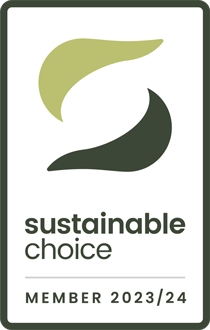
SUSTAINABLE CHOICE
John West is a Foundation Member of Sustainable Choice, an independent digital destination where we can share our sustainability credentials with our consumers.
Our Sustainable Choice membership represents our commitment to sharing the progress of our sustainability journey and celebrating our achievements along the way.
As a member, we use the Sustainable Choice platform to communicate our sustainability ambitions to our consumers, stakeholders and the general public with honesty, integrity and transparency.
WWF
John West supports World Wide Fund for Nature's (WWF) efforts to protect marine life and expand sustainable fishing practices globally - a partnership to create lasting change through a collaboration of business, science and conservation.
WWF is the world's largest conservation organization, working in over 100 countries as well as oceans around the globe. With the support of almost five million members worldwide, WWF is dedicated to delivering science-based solutions to preserve the diversity and abundance of life on Earth, stop the degradation of the environment and combat climate change.
In 2012, to further improve the sustainability of our seafood supply chain, we were one of the first seafood brands in Australia to form a partnership with WWF. We are proud to continue this work with WWF into the future.
Our partnership with WWF commits John West Australia to WWF’s Global Sustainable Seafood Charter. This Charter jointly commits John West Australia and WWF to:
- contribute to a future in which sustainable fisheries thrive in healthy ecosystems, benefiting people, businesses and species that depend on them
- work together towards sustainable fisheries management and aquaculture production
- safeguard valuable marine ecosystems, ensuring the long term viability of seafood supply that we all depend on
Ultimately this partnership has resulted in John West Australia working towards all products being responsibly sourced and developing full traceability procedures demonstrating that they are sourced from:
- Marine Stewardship Council (MSC) certified fisheries; or
- Aquaculture Stewardship (ASC) certified farms; or
- Where MSC/ASC products which meet our product specifications are not available, John West Australia will only use:
- responsibly source seafood products as advised by WWF; or
- seafood products sourced from a fishery or aquaculture operation which is the subject of an improvement project recognised by WWF.
Through our partnership with WWF, we are also investing in developing WWF conservation projects under the John West Conservation Program to improve the social, environmental performance of tuna fisheries and surrounding communities in the Pacific and Indian Oceans.
SUSTAINABLE CHOICE
John West is a Foundation Member of Sustainable Choice, an independent digital destination where we can share our sustainability credentials with our consumers.
Our Sustainable Choice membership represents our commitment to sharing the progress of our sustainability journey and celebrating our achievements along the way.
As a member, we use the Sustainable Choice platform to communicate our sustainability ambitions to our consumers, stakeholders and the general public.
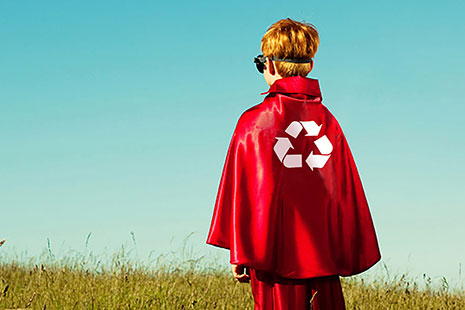
REDCYCLE PROGRAM
Date: 9 December 2022
Simplot the manufacturer of John West was a founding member and is a long-time supporter of the REDcycle Program which was aimed at offering consumers a simple way to recycle their soft plastic packaging rather than sending it to landfill. As such, we are disappointed by REDcycle’s announcement in November 2022 to pause the program.
Given REDcycle has indicated the program is temporarily on pause we are assessing if it is appropriate to make changes to the REDcycle labelling or Australasian Recycling Label on our JohnWest products, which currently instructs people to return soft plastics to the store.
However, until an alternate solution is available, consumers are encouraged to put their soft plastics in their home rubbish bin, not in kerbside recycling bins (unless the Curby or NPRS trial is available in your area) as it is not recyclable in that system.
Finding long-term solutions that continue to advance recycling initiatives and help us to meet Australia’s National Packaging Targets will require the combined efforts of government, industry, NGOs, packaging manufacturers, waste recovery and recycling industries. Simplot and its brands continue to support and work to advance these efforts.
REDcycle Program Temporarily on Pause
Date: 9 December 2022
Simplot the manufacturer of John West was a founding member and is a long-time supporter of the REDcycle Program which was aimed at offering consumers a simple way to recycle their soft plastic packaging rather than sending it to landfill. As such, we are disappointed by REDcycle’s announcement in November 2022 to pause the program.
Given REDcycle has indicated the program is temporarily on pause we are assessing if it is appropriate to make changes to the REDcycle labelling or Australasian Recycling Label on our IandJ products, which currently instructs people to return soft plastics to the store.
However, until an alternate solution is available, consumers are encouraged to put their soft plastics in their home rubbish bin, not in kerbside recycling bins (unless the Curby or NPRS trial is available in your area) as it is not recyclable in that system.
Finding long-term solutions that continue to advance recycling initiatives and help us to meet Australia’s National Packaging Targets will require the combined efforts of government, industry, NGOs, packaging manufacturers, waste recovery and recycling industries. Simplot and its brands continue to support and work to advance these efforts.



